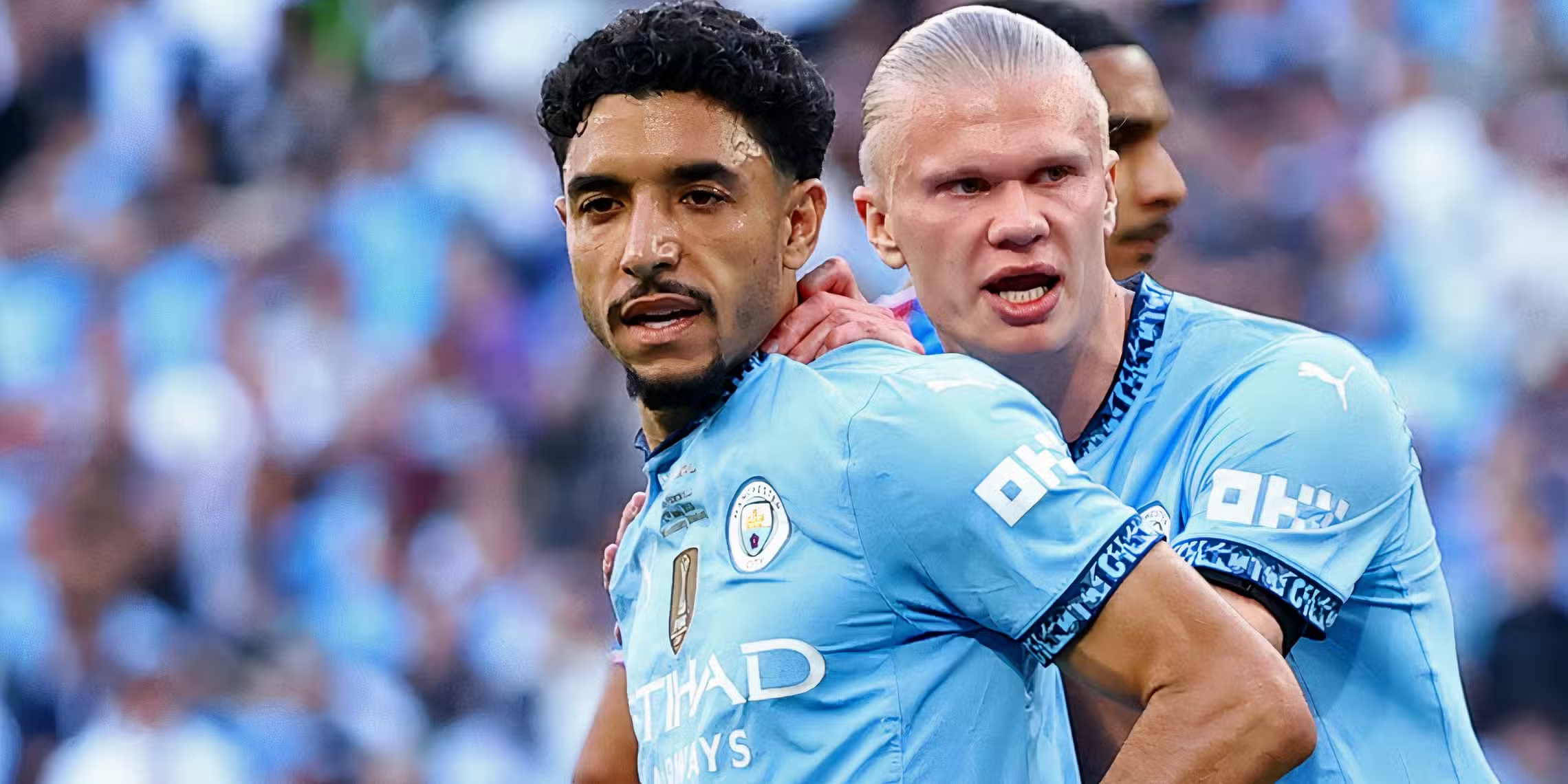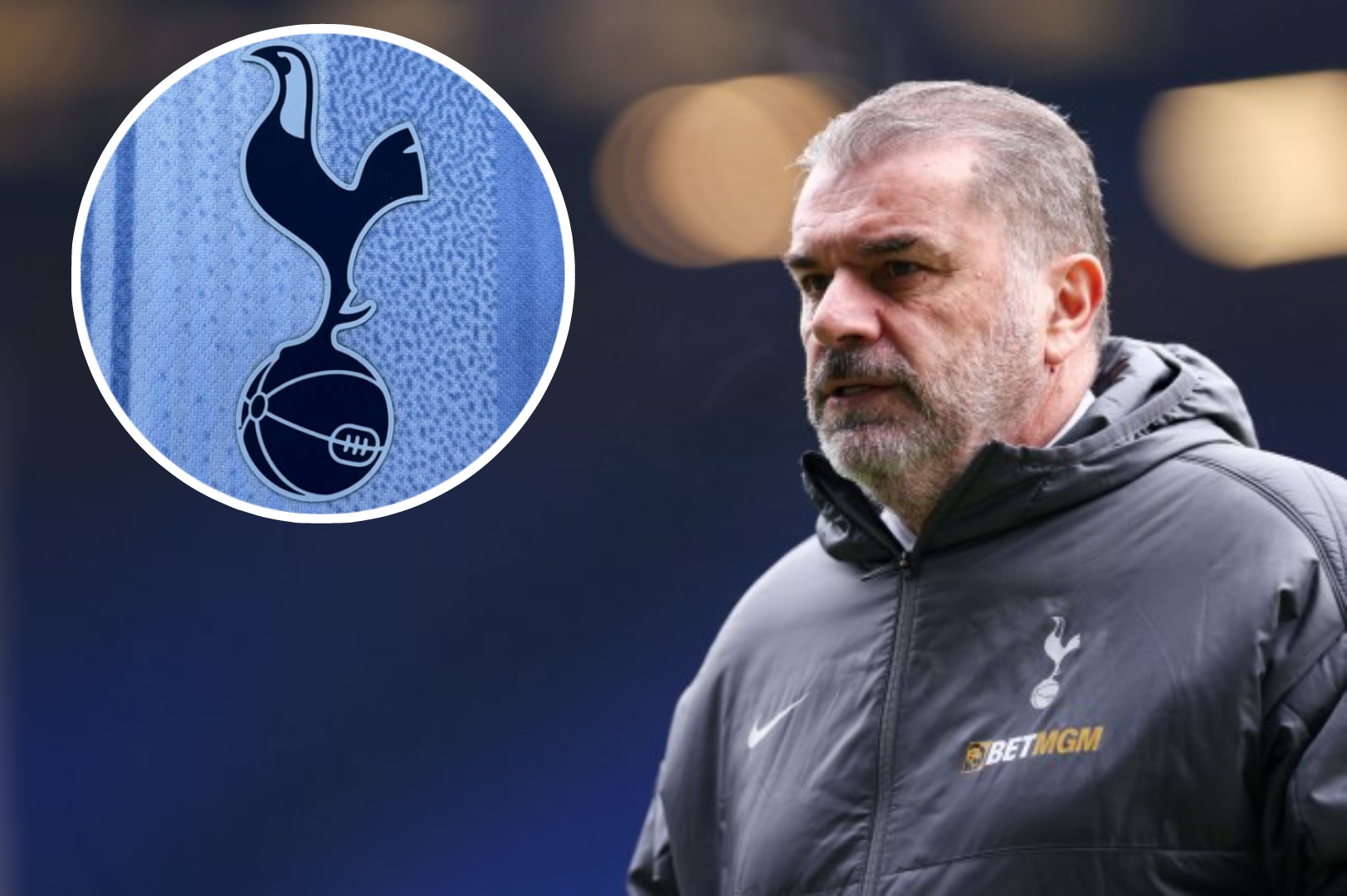In a stunning post-match revelation that has sent shockwaves through the football world, Manchester City manager Pep Guardiola has finally broken his silence on the controversial penalty incident involving Erling Haaland and Frankfurt’s Omar Marmoush that many believe cost his team the FA Cup. The usually composed Catalan tactician did not hold back as he addressed the media, offering unprecedented insight into what transpired during those crucial moments at Wembley Stadium.
The Incident That Changed Everything
The scene was set for another chapter in Manchester City’s era of dominance. Wembley Stadium, packed to capacity with 90,000 fans, buzzed with anticipation as the FA Cup final between Manchester City and Eintracht Frankfurt reached its climax. With the score delicately poised at 1-1 and just seven minutes of regulation time remaining, City won a penalty that seemed destined to secure them yet another trophy for their burgeoning collection.
What happened next would become one of the most talked-about incidents in recent FA Cup history.
As designated penalty taker Erling Haaland placed the ball on the spot, Frankfurt’s Egyptian forward Omar Marmoush approached the Norwegian striker. What initially appeared to be standard psychological gamesmanship quickly evolved into something more significant. Witnesses reported an animated conversation between the two players, with Marmoush gesturing emphatically toward City’s goal.
Moments later, in a decision that left teammates, coaching staff, and supporters alike in visible disbelief, Haaland stepped aside, allowing Marmoush to take the penalty against his own team. The Frankfurt forward’s subsequent attempt was spectacularly saved by his own goalkeeper, Kevin Trapp, who had apparently been tipped off about his teammate’s preferred penalty direction.
The momentum shift was immediate and devastating for City. Frankfurt countered quickly, scoring twice in the final minutes to secure a shocking 3-1 victory and lift the FA Cup trophy in one of the competition’s greatest upsets.
Guardiola’s Bombshell Revelation
For weeks following the defeat, speculation ran rampant about what exactly had transpired between Haaland and Marmoush. Theories ranging from miscommunication to elaborate mind games flooded social media and sports talk shows. Manchester City’s press team maintained a disciplined silence, with players offering only vague responses when questioned about the incident.
Yesterday, however, during a pre-match press conference ahead of City’s Premier League fixture against Brighton, Guardiola finally addressed the controversy with remarkable candor.
“What happened with Erling and Marmoush was something I have never seen in my career,” Guardiola began, his usually animated demeanor replaced by a more somber tone. “There was a misunderstanding of catastrophic proportions that ultimately cost us the FA Cup.”
According to Guardiola, Marmoush had approached Haaland at the penalty spot and engaged in what the City striker believed was standard football camaraderie.
“Erling told me that Marmoush came to him speaking in a mixture of English and German, congratulating him on his season and mentioning that they had mutual friends from their time in the Bundesliga,” Guardiola explained. “Then Marmoush said something that Erling interpreted as a request for the penalty as a gesture of sportsmanship, claiming he had never scored at Wembley and this was a dream opportunity.”
The City manager revealed that Haaland, known for his straightforward and sometimes naive approach to the game’s psychological aspects, made an on-the-spot decision that would prove disastrous.
“Erling thought he was engaging in an act of sportsmanship that would be remembered as a beautiful moment in football. He didn’t realize that Marmoush was actually a Frankfurt player until it was too late. The noise in the stadium, the pressure of the moment, and perhaps some language barriers created a perfect storm of confusion.”
Behind the Scenes: The Dressing Room Aftermath
Guardiola’s revelations extended to the immediate aftermath in the dressing room, painting a picture of shock, disbelief, and ultimately, accountability.
“When we returned to the dressing room, there was initial anger, of course. Kevin [De Bruyne] was particularly vocal,” Guardiola admitted. “But when we understood what had happened, how Erling had been essentially tricked in a moment of high pressure, the anger turned to disbelief.”
The City manager described a tearful Haaland apologizing to his teammates, devastated by his naive mistake. “Erling is a pure soul in many ways. His competitive nature is matched only by his sportsmanship. He was broken by what happened, and it was hard to watch.”
Perhaps most surprisingly, Guardiola revealed that he personally took ultimate responsibility for the incident. “As a manager, it is my job to prepare my players for every scenario. We had never discussed what to do if an opponent asks to take our penalty. It seems absurd now, but it’s a scenario I failed to prepare them for. That’s on me.”
Marmoush’s Cunning Psychological Warfare
The Frankfurt forward’s audacious gambit has been analyzed extensively by sports psychologists and football tacticians alike. Dr. Elena Petrova, a leading sports psychologist who works with several Premier League clubs, offered her perspective on Marmoush’s tactics.
“What Marmoush attempted was a form of pattern interruption, a psychological technique designed to disrupt an opponent’s established routine,” Dr. Petrova explained. “By introducing an unexpected social element—a seemingly friendly conversation—during a high-pressure moment, he created cognitive dissonance for Haaland, who had to simultaneously process the penalty routine and this unusual social interaction.”
Frankfurt manager Oliver Glasner has remained tight-lipped about the incident, neither confirming nor denying that it was a planned tactic. However, sources close to the Frankfurt camp suggest that Marmoush’s multilingual abilities—he speaks Arabic, German, and English—were deliberately deployed to create confusion.
Former referee Mike Dean, analyzing the incident for Sky Sports, noted that there was technically no rule violation. “While it’s certainly unusual and perhaps against the spirit of the game, there’s nothing in the laws of football that prevents one player from asking another to take their penalty. It’s unsportsmanlike, but not illegal.”
The Historical Context: Football’s Greatest Psychological Battles
The Haaland-Marmoush incident now joins a storied history of psychological battles in football’s biggest matches. From Bruce Grobbelaar’s famous “wobbly legs” in the 1984 European Cup final penalty shootout to Jerzy Dudek’s “Grobbelaar-inspired” antics in Istanbul 2005, goalkeepers have long employed psychological tactics to gain an advantage.
Field players, too, have engaged in mental warfare, though rarely with the brazenness displayed by Marmoush. Luis Suárez’s deliberate handball against Ghana in the 2010 World Cup quarterfinals and Zinedine Zidane’s infamous headbutt in the 2006 World Cup final represent moments where psychology and emotion dramatically altered the course of crucial matches.
Sports historian Professor Jonathan Wilson contextualizes the incident: “What makes the Haaland-Marmoush situation unique is that it involved a level of deception we rarely see in modern football. Most psychological tactics are overt—trash-talking, intimidation, delaying tactics. This was something altogether more subtle and, many would argue, more devious.”
Impact on Haaland’s Career and Mental State
Concerns about how this incident might affect Haaland’s phenomenal career have dominated discourse in football circles. The Norwegian striker, who had scored an astonishing 52 goals in all competitions before the FA Cup final, has maintained a low profile since the match, even temporarily deactivating his social media accounts in the immediate aftermath.
Guardiola addressed these concerns directly in his press conference. “Erling is strong—mentally, physically, emotionally. This will not define him. We have worked with our psychology team to ensure he processes this experience correctly, and I can tell you he is now more determined than ever.”
Former Manchester United striker and now pundit Wayne Rooney offered a player’s perspective: “Every great striker has moments that test their mentality. How Haaland responds to this will determine whether he becomes one of the all-time greats or just another very good striker. The truly great ones use these moments as fuel.”
Early indications suggest Haaland has indeed channeled the experience constructively. In City’s first pre-season friendly, played behind closed doors against Girona, Haaland scored a hat-trick, and pointedly took and converted a penalty with what observers described as “thunderous conviction.”
City’s Tactical Adjustments and Penalty Protocols
The incident has prompted Manchester City to completely overhaul their approach to penalty situations. Guardiola revealed that the club has instituted a more formal protocol for penalty-taking, with clear communication lines established between the designated taker, the captain, and the technical area.
“We now have a very structured process,” Guardiola explained. “The designated penalty taker is announced before each match, with two backups in a specific order. Any deviation from this requires explicit confirmation from the captain and a signal from the bench. It seems excessive, perhaps, but we cannot allow such a misunderstanding to happen again.”
City’s coaching staff has also introduced dedicated sessions focusing on handling psychological pressure and unexpected scenarios during matches. Sports psychologist Dr. James Carter has been added to the first-team staff with specific responsibility for preparing players for high-pressure moments.
“Football is increasingly a psychological battle,” Guardiola acknowledged. “The margins at the highest level are so small that mental strength often determines the outcome. We are now investing as much in our players’ minds as we do in their bodies and technical skills.”
Marmoush: Villain or Clever Competitor?
Public opinion remains divided on Marmoush’s actions. To Frankfurt supporters, he has achieved hero status for his clever exploitation of an opportunity. To many neutrals, his actions represent a shrewd, if somewhat unsportsmanlike, example of winning by any means necessary. To City fans, however, he remains a villain who unfairly manipulated a moment of sportsmanship.
Former Arsenal manager Arsène Wenger offered a nuanced perspective: “Football is not just about physical and technical ability; it’s about intelligence and psychology. What Marmoush did was certainly clever, but it raises questions about where we draw the line between tactical intelligence and unsporting behavior.”
Marmoush himself has remained largely silent on the matter, offering only a cryptic response when questioned by German media: “Football is a game of moments and opportunities. Sometimes, you must create your own luck.”
The Egyptian forward’s market value has reportedly increased by €15 million since the incident, with several top European clubs expressing interest in signing a player who has demonstrated such remarkable composure and psychological acuity in a high-pressure situation.
Regulatory Fallout and Potential Rule Changes
The incident has prompted the International Football Association Board (IFAB), the body responsible for the laws of the game, to consider introducing new regulations regarding conduct during penalty situations.
An IFAB spokesperson confirmed that the matter would be discussed at their next annual meeting: “While the current laws don’t specifically prohibit what occurred, we continuously review the rules to ensure they uphold the spirit of fair play. This incident has certainly given us something to consider.”
Proposed changes could include restrictions on who may communicate with the designated penalty taker and specific protocols for how such communication should occur. Some have suggested a more radical approach, including a “clear zone” around the penalty spot where only the designated taker and goalkeeper would be permitted.
Former Premier League referee Mark Clattenburg believes such changes would be difficult to implement: “The beauty and complexity of football is that it’s a game of continuous human interaction. Over-regulating these moments could rob the sport of its spontaneity and drama, which are essential to its appeal.”
The Wider Implications for Football Culture
Beyond the immediate impact on Manchester City and the potential regulatory changes, the Haaland-Marmoush incident has sparked a broader conversation about sportsmanship, gamesmanship, and the ever-blurring line between the two in modern football.
FIFA’s Fair Play Committee has announced a comprehensive review of similar incidents throughout football history, with the aim of developing clearer guidelines for what constitutes acceptable psychological tactics.
“This incident has forced us to confront difficult questions about the nature of competition itself,” said FIFA Ethics Committee member Claudio Sulser. “Is deception ever acceptable in pursuit of victory? How do we balance the strategic and psychological elements of sport with the principles of fair play that should underpin it?”
Cultural commentators have noted that the incident reflects wider societal tensions around competition and success. In an era where winning often seems to justify any means, the Haaland-Marmoush controversy serves as a microcosm of these broader ethical questions.
Guardiola’s Philosophy Tested
For Pep Guardiola, a manager whose philosophy has always emphasized beauty and integrity alongside winning, the incident has prompted deep reflection. Throughout his career at Barcelona, Bayern Munich, and Manchester City, Guardiola has consistently advocated for a pure approach to football, emphasizing technical excellence and tactical innovation over gamesmanship.
“This experience has challenged my thinking,” Guardiola admitted. “I have always believed that football played the right way—with skill, intelligence, and respect—will ultimately prevail. But perhaps I have been naive. Perhaps part of playing ‘the right way’ is preparing your players for every scenario, including those that seem to violate the spirit of the game.”
The Catalan manager revealed that he had spoken with his mentor, Johan Cruyff, about similar situations before the Dutch master’s passing in 2016. “Johan always said that football is not just about what you do with the ball but about how you manage all aspects of the game. He would have been disappointed that we were caught unprepared but would have used it as a learning opportunity.”
Looking Forward: City’s Response on the Pitch
As Manchester City prepares for the new season, the FA Cup final defeat has clearly influenced their approach. Sources close to the club report that training sessions have taken on a new intensity, with particular focus on game management and mental toughness.
“The players have made a pact,” revealed a club insider who wished to remain anonymous. “They’ve promised each other that no trophy will ever again be lost through naivety or lack of preparation for any scenario, no matter how unlikely.”
The club’s transfer strategy has also reportedly been affected, with greater emphasis placed on recruiting players with proven leadership qualities and experience in high-pressure situations. The signing of veteran defender Niklas Süle from Borussia Dortmund, a player known for his commanding presence and psychological resilience, appears to reflect this new priority.
Conclusion: A Defining Moment in Modern Football
As the dust settles on one of football’s most unusual controversies, it’s clear that the Haaland-Marmoush penalty incident will be remembered as a defining moment in the sport’s psychological evolution. For Manchester City and Pep Guardiola, it represents both a painful failure and a valuable lesson. For Erling Haaland, it marks a critical juncture in his development from talented scorer to complete footballer. For Omar Marmoush and Eintracht Frankfurt, it stands as a moment of opportunistic brilliance that secured their place in FA Cup folklore.
Guardiola’s final words on the matter perhaps best encapsulate its significance: “In football, as in life, sometimes the most painful lessons are the most valuable. We lost a trophy, yes, but we gained a level of awareness that will make us stronger. The next time someone tries something like this—and there will be a next time—we will be ready.”
As the new season approaches, all eyes will be on Haaland, Guardiola, and Manchester City to see how they channel this experience into their pursuit of redemption. If the manager’s revelations and the team’s response are any indication, the footballing world should brace itself for a City team that combines their traditional technical brilliance with a new edge of psychological warfare—a potentially formidable evolution of Guardiola’s football philosophy that could define the next chapter of his illustrious career.



